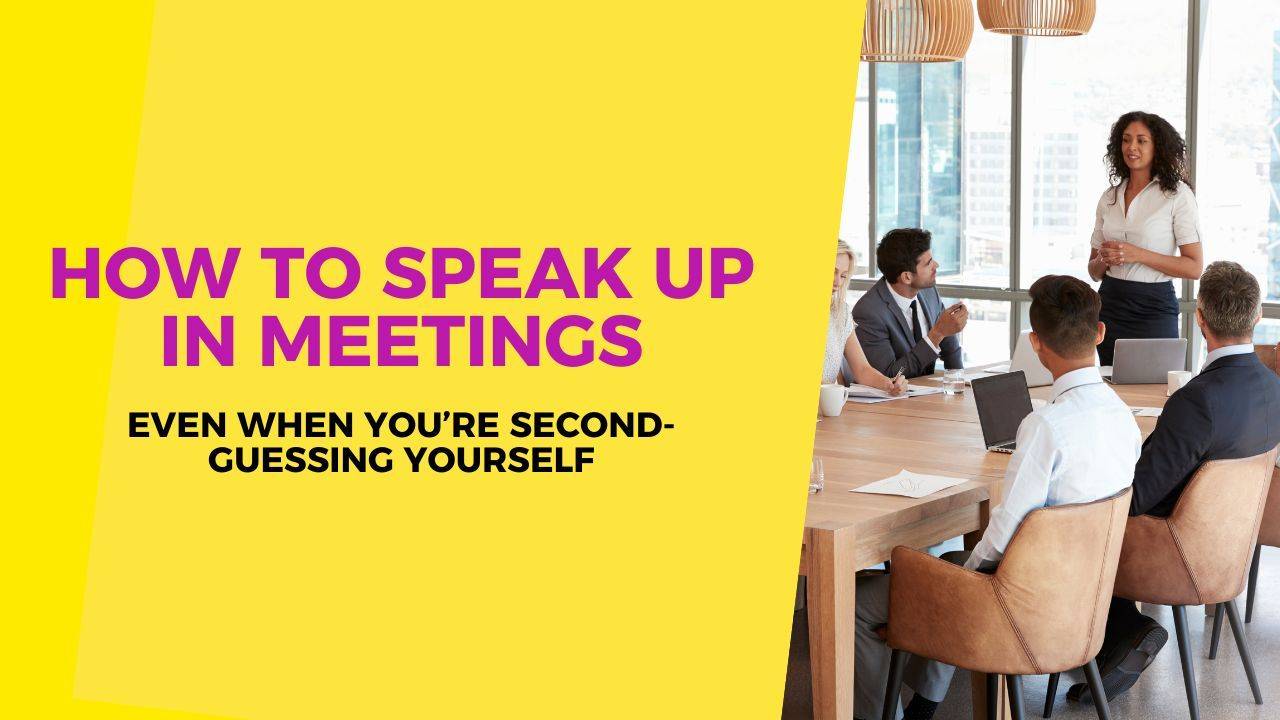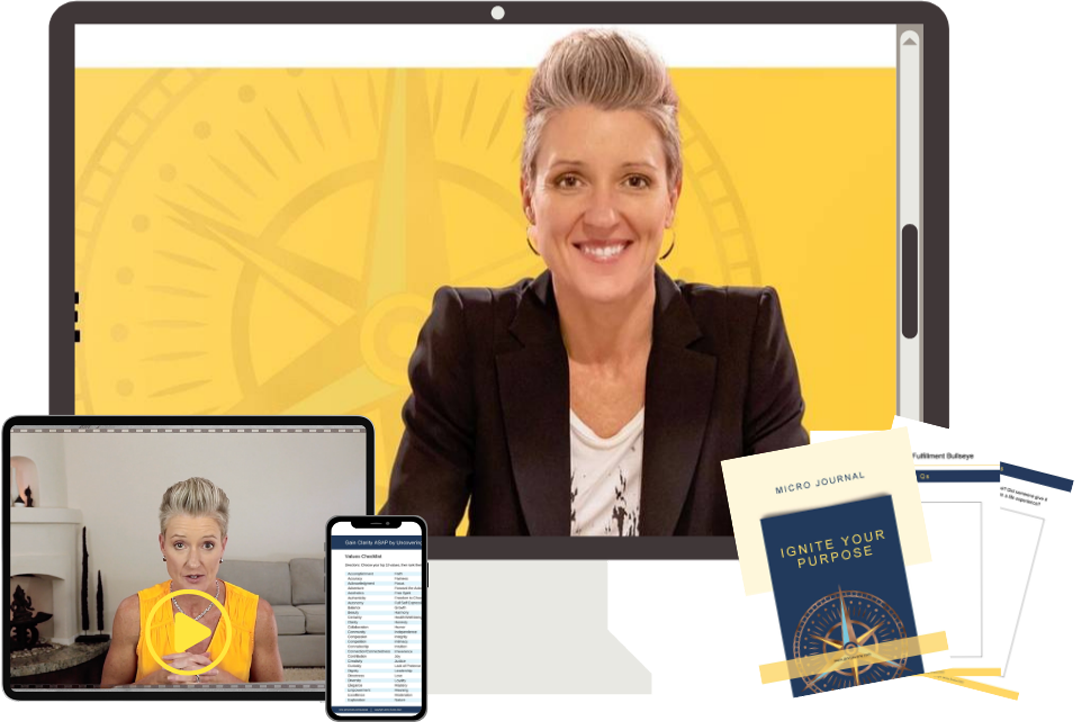How to Speak Up in Meetings (Even When You’re Second-Guessing Yourself)
Oct 28, 2025
You know that moment.
You’re in a meeting, you’ve got an idea forming—maybe even a really good one—and your brain starts to whisper:
Wait. What if this sounds dumb?
Someone else probably already thought of that.
I’ll say it after they finish…
…and then the moment passes.
Someone else says something similar, everyone nods, and you sit there silently screaming, I literally just thought of that!
If you’ve ever replayed that loop on your drive home, you’re not alone. It’s one of the most common confidence traps high-performing professionals fall into—not because they lack intelligence or ideas, but because their biology and beliefs are working against them.
Let’s fix that.
And it isn’t about “speaking louder” or “faking it till you make it.” It’s about understanding the science behind why you freeze, rewiring that reaction, and building the calm authority that allows you to speak up when it matters most.
You’re Not Broken—You’re Biochemical
When you hesitate in a meeting, it’s not necessarily weakness. It’s also chemistry.
The human brain doesn’t differentiate between a boardroom and a battlefield. The same stress response that helped your ancestors avoid predators now kicks in when your VP raises an eyebrow.
Here’s what happens in real time:
-
Your amygdala (the brain’s threat detector) senses risk—judgment, rejection, embarrassment.
-
It floods your system with cortisol and adrenaline, priming you to fight, flee, or freeze.
-
Blood flow leaves your prefrontal cortex (the part that plans, reasons, and forms articulate sentences) and rushes to your limbs.
Translation? Your body is preparing to run, not to speak.
That’s why your heart races, your mouth goes dry, and your mind blanks when it’s your turn to talk.
Good news: you can train your chemistry to chill.
Quick chemiscal resets I teache in programs:
-
Do the physiological sigh. Do one big, sharp inhale through your nose, then another smaller inhale at the top, then exhale slowly through the mouth. Repeat 1-3 times. This calms the nervous system by re-inflating the collapsed air sacs in the lungs and offloading excess carbon dioxide, which signals the body to relax and reduces anxiety.
-
Do a Micro Burst before the meeting or event. Do a Micro Burst before the meeting or event. Just 30-60 seconds of intense physical movement flushes out the stress hormone cortisol. Think jumping jacks, a sprint up a flight of stairs, or push-ups.
You can’t always control your stress triggers—but you can absolutely regulate your body’s response.
From Performing to Contributing
Here’s the next confidence trap: believing you have to perform confidence instead of contribute value.
When you enter a meeting trying to “sound smart,” you turn inward—judging, editing, rehearsing. That drains energy and raises anxiety.
But when you shift focus outward—to the impact of your idea instead of the impression you’re making—your nervous system relaxes.
Confidence doesn’t come from self-perfection. It comes from purpose.
Try this mindset pivot:
Before a meeting, ask yourself one question:
“What value do I want to add today?”
That question flips your brain from self-protection to contribution.
It grounds your energy, lowers adrenaline, and naturally improves clarity.
When you anchor on contribution, you stop trying to prove you belong—and start demonstrating that you do.
The Inner Dialogue Detox
The harshest critic in any meeting usually lives inside your own head.
You might hear:
-
“They’re smarter than me.”
-
“I’ll sound repetitive.”
-
“I don’t have the title for that comment.”
These thoughts aren’t truth; they’re just neural pathways.
Every time you believe them, you reinforce that pathway. Every time you interrupt them, you weaken it.
Reframe the loop:
-
Instead of “I’ll sound stupid,” try “My insight adds perspective.”
-
Instead of “It’s already been said,” try “I can build on that idea.”
-
Instead of “I don’t have authority,” try “I bring expertise they don’t.”
Confidence isn’t about never doubting yourself—it’s about acting anyway.
Each time you override hesitation, your brain literally wires for courage.
Calm Is Contagious (and Powerful)
Ever notice how one grounded person can change the entire tone of a room?
That’s not charisma—it’s biology again. Humans have mirror neurons, meaning our nervous systems unconsciously sync to others. When you project calm, others feel it. When you spiral, they do too.
So the most powerful thing you can bring to a meeting isn’t a PowerPoint—it’s regulated energy.
Your micro-presence practice:
-
Pause before speaking. A one-breath pause signals composure and gives your brain oxygen to articulate.
-
Lower your voice slightly. A calm, steady tone reads as credibility.
-
Hold eye contact after finishing your sentence. Confidence lives in the silence after your words.
These tiny cues don’t just make people listen differently—they make you feel different. Your body believes your behavior, and that belief builds momentum.
Words That Weaken vs. Words That Win
Sometimes we sabotage ourselves with language that undercuts our credibility.
Let’s clean that up.
Phrases to ditch:
-
“This might sound stupid, but…”
-
“I could be wrong, but…”
-
“Does that make sense?” (as if you’re apologizing for existing)
Try these instead:
-
“Here’s what I’m seeing…”
-
“I recommend…”
-
“One perspective we haven’t covered yet is…”
Confident communication isn’t about bravado—it’s about clarity. You can sound assertive without aggression, decisive without domination.
When you speak with conviction and curiosity, you create trust. People stop hearing noise and start hearing leadership.
Practice Confidence Where It’s Safe
No one builds confidence in the middle of a high-stakes board meeting. You build it in low-risk reps.
Start small. Speak first in a team huddle, contribute to a brainstorming chat, or volunteer to summarize next steps at the end of a call.
Each small moment strengthens your “speak-up muscle.”
Physiologically, you’re teaching your brain: This is safe. We’ve done this before.
Confidence is a physiological memory.
The more you practice calm contribution, the more natural it feels under pressure.
One of my clients—a brilliant analyst who never spoke in leadership meetings—started by asking one question per call. Within a month, she was leading project updates. When we rewired her body’s stress pattern, her voice followed.
When You Freeze in the Moment
Let’s be real: even with practice, sometimes your brain still blanks.
Here’s your emergency reset:
-
Breathe. One slow inhale through the nose, one longer exhale through the mouth.
-
Ground. Feel your feet or chair; let your body settle.
-
Buy time. Use bridging phrases:
-
“That’s a great question—giveme a second to gather my thoughts.”
-
“I’d like to build on what’s been said from a different angle.”
-
“Here’s how I’m thinking about that…”
Pausing isn’t weakness—it’s wisdom. The smartest leaders use silence as strategy.
Redefining What It Means to “Speak Up”
Speaking up isn’t about being the loudest voice in the room. It’s about using your voice intentionally.
Sometimes that means asking the question no one else will.
Sometimes it’s offering a perspective from lived experience.
Sometimes it’s saying, “I disagree,” respectfully and clearly.
Quiet voices can carry enormous weight when they come from alignment, not anxiety.
Remember: people don’t just hear your words—they feel your energy.
If you speak from steadiness, not stress, you’ll command more attention than any raised volume ever could.
The Confidence Compound Effect
Each time you speak up, you reinforce self-trust.
Self-trust turns into momentum.
Momentum turns into presence.
It’s not about being perfect—it’s about being progressive.
You don’t go from silence to spotlight overnight. You build confidence brick by brick, meeting by meeting, moment by moment.
And one day you’ll notice:The idea that once made your heart race is now just part of the conversation.
That’s growth you can measure—not in decibels, but in calm.
Final Thoughts: Your Voice Is Needed
The world doesn’t need more noise. It needs more grounded leaders willing to speak from clarity, not chaos.
You don’t need to have all the answers to contribute.
You don’t need a title to make an impact.
You just need to show up, breathe, and trust that your perspective matters.
Because it does.
Every time you speak up, you make it easier for someone else to do the same.
So the next time that internal voice starts to whisper, “Maybe stay quiet,”
Take a breath.
Remember what’s true.
And speak anyway.
Want to help your team communicate with calm confidence?
Bring Jenny’s Communication Under Pressure or resilience and leadership programs to your organization.
Explore Programs


